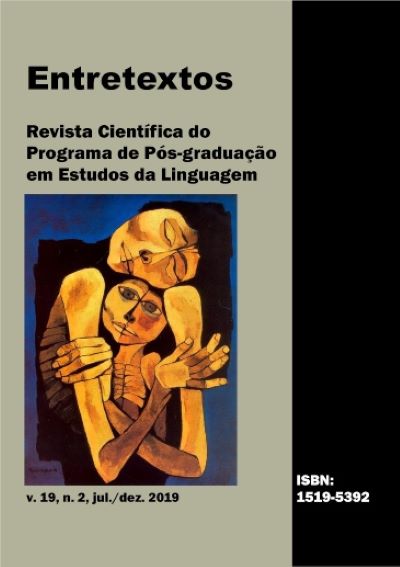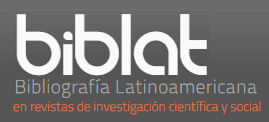How does the student analyze a chronicle without the narrator of the story?
DOI:
https://doi.org/10.5433/1519-5392.2019v19n2p215Keywords:
Chronicle, Narrator, Inferential activities, AwarenessAbstract
This article aims to teach reading procedures to students of the 5th grade of Elementary School, in order to make them develop a reader behavior. Therefore, the purpose of this work was to guide students to observe chronicles that were constructed with a narrator’s presence or not. Thus, it was necessary to create a sequence of activities with inferential questions that probably imply the awareness of the object of knowledge. For that, this work is based on the sociodiscursive interactionist conception (BAKHTIN, 2016; DOLZ; GAGNON; DECÂNDIO, 2010; SCHNEUWLY, 2004) and Vygotsky’s ideas (2007, 2009). It also discusses the process of awareness and the social interaction relations, which allows a significant advance in student learning and development, besides other authors. The results show that, when good interventions are done, these interventions lead the students to think about the studied text, making them to observe the linguistic and notational aspects used by authors. In conclusion, the teaching of the reading procedures allows the students to make choices about the elements that make up a narrative for their own texts later.References
BRAGA, Rubem. Negócio de menino. In: ANDRADE, Carlos Drummond de, SABINO, Fernando; MENDES CAMPOS, Paulo; BRAGA, Rubem. Crônicas 1. São Paulo: Ática, 2003, v. 1, p. 21-23. (Para gostar de ler).
CAMPOS, Paulo Mendes. Continho. In: ANDRADE, Carlos Drummond de, SABINO, Fernando; MENDES CAMPOS, Paulo; BRAGA, Rubem. Crônicas 1. São Paulo: Ática, 2003. v. 1, p. 85. (Para gostar de ler).
CANDIDO, Antonio. A vida ao rés-do-chão. In: CANDIDO, Antonio. A crônica: o gênero, sua fixação e suas transformações no Brasil. Campinas, SP: Editora da Unicamp; Rio de Janeiro: Fundação Casa de Rui Barbosa, 1992. p. 13-22.
COSCARELLI, Carla Viana. Inferência: afinal o que é isso? Belo Horizonte: FALE/UFMG, 2003. Disponível em:
http://bbs.metalink.com.br/~icoscarelli/publica.htm. Acesso em: 22 maio 2017.
COSCARELLI, Carla Viana. Reflexões sobre as inferências. In: CONGRESSO BRASILEIRO DE LINGUÍSTICA APLICADA, 6., 2002, Belo Horizonte. Anais ... Belo Horizonte: UFMG, 2002. 1 CD-ROM.
DOLZ, Joaquim; GAGNON, Roxane; DECÂNDIO, Fabrício. Produção escrita e dificuldades de aprendizagem. Tradução de Fabrício Decândio e Anna Rachel Machado. Campinas, SP: Mercado de Letras, 2010.
LERNER, Délia. Ler e escrever na escola: o real, o possível e o necessário. Porto Alegre: Artmed, 2002.
MARCUSCHI, Luiz Antônio. Leitura como processo inferencial num universo cultural-cognitivo. In: BARZOTTO, Valdir Heitor (org.). Estado de leitura. Campinas, SP: Mercado de Letras, 1999.
OLIVEIRA, Marta Kohl de. O problema da afetividade em Vygotsky. In: LA TAILLE, Yves de; OLIVEIRA, Marta Kohl de; DANTAS, Heloysa. Piaget, Vygotsky, Wallon: teorias psicogenéticas em discussão. São Paulo: Summus, 1992. p. 75-84.
PROENÇA FILHO, Domício. A linguagem literária. São Paulo: Ática, 1990.
SABINO, Fernando. Hora de dormir. In: ANDRADE, Carlos Drummond de, SABINO, Fernando; MENDES CAMPOS, Paulo; BRAGA, Rubem. Crônicas 1. São Paulo: Ática, 2003. v. 1, p. 11-14.
SCHNEUWLY, Bernard. Gênero e tipos de discurso: considerações psicológicas e ontogenéticas. In: SCHNEUWLY, Bernard; DOLZ, Joaquim. Gêneros orais e escritos na escola. Tradução de Roxane Roxo e Glaís Sales Cordeiro. Campinas, SP: Mercado de Letras, 2004.
SIEBERT, Silvânia. A crônica brasileira tecida pela história, pelo jornalismo e pela literatura. Linguagem em (Dis)curso LemD, Tubarão, SC, v. 14, n. 3, p. 675-685, set./dez. 2014. Disponível em: http://www.scielo.br/pdf/ld/v14n3/1518-7632-ld-14-03-00675.pdf. Acesso em: 8 jun. 2018.
SILVA, Elisabeth Ramos da; ABUD, Maria José Milharezi. A apreensão de aspectos morfossintáticos que iluminam os sentidos do gênero poema. Revista Diadorim, Rio de Janeiro, v. 19, n. 2, p. 153-168, jul./dez. 2017. Disponível em: https://revistas.ufrj.br/index.php/diadorim/article/view/9959. Acesso em: 10 jun. 2018.
VARGAS, Diego da Silva. Por uma visão cognitivista do processo de
inferenciação em leitura. Ciências & Cognição, Rio de Janeiro, v. 20, n. 2, p. 313-330, 2015. Disponível em: http://www.cienciasecognicao.org. Acesso em: 14 maio. 2018.
VIGOTSKI, Lev Semenovich. A formação social da mente: o desenvolvimento dos processos psicológicos superiores. Tradução de José Cipolla Neto, Luís Silveira Menna Barreto e Solange castro Afeche. 7. ed. São Paulo: Martins Fontes, 2007.
VIGOTSKY, Lev Semenovich. A construção do pensamento e da linguagem. Tradução de Paulo Bezerra. 2. ed. São Paulo: Martins Fontes, 2009.
Downloads
Published
How to Cite
Issue
Section
License
Entretextos adota a Licença Creative Commons Attribution 4.0 International, portanto, os direitos autorais relativos aos artigos publicados são do(s) autor (es), que cedem à Entretextos o direito de exclusividade de primeira publicação.
Sob essa licença é possível: Compartilhar - copiar e redistribuir o material em qualquer suporte ou formato. Adaptar - remixar, transformar, e criar a partir do material, atribuindo o devido crédito e prover um link para a licença e indicar se mudanças foram feitas.




















